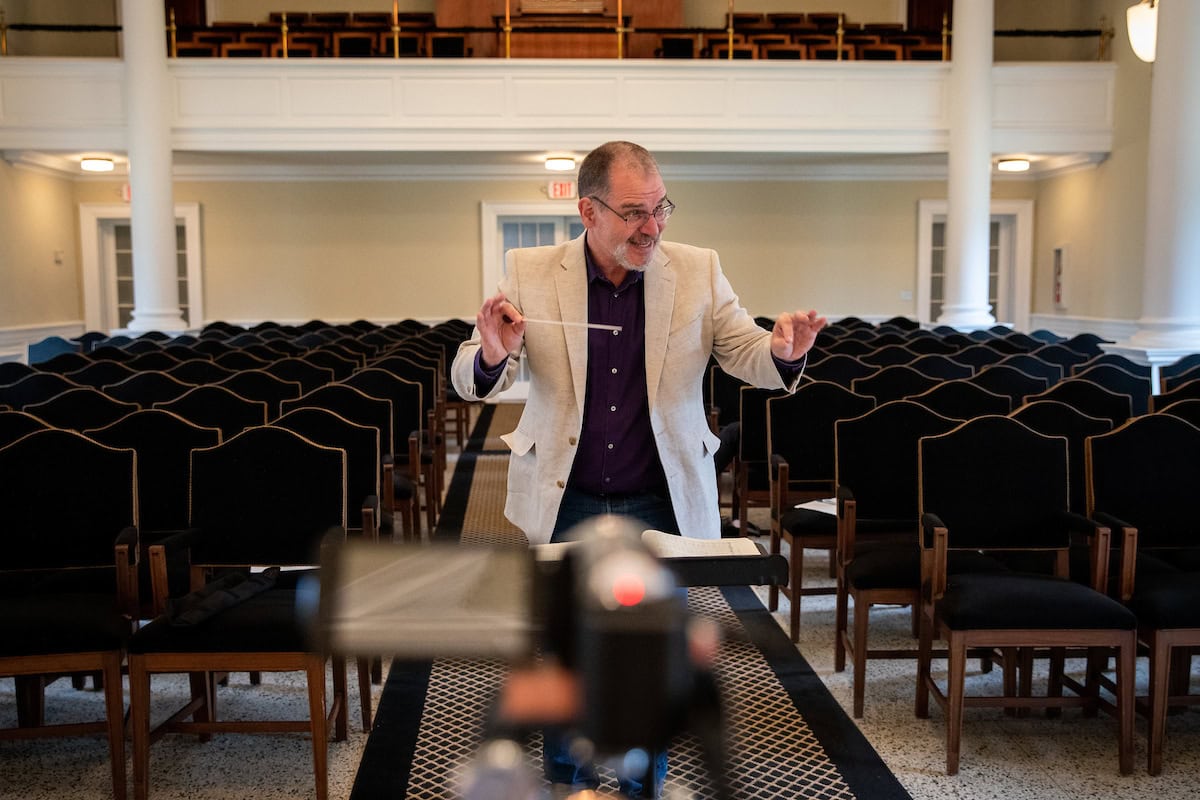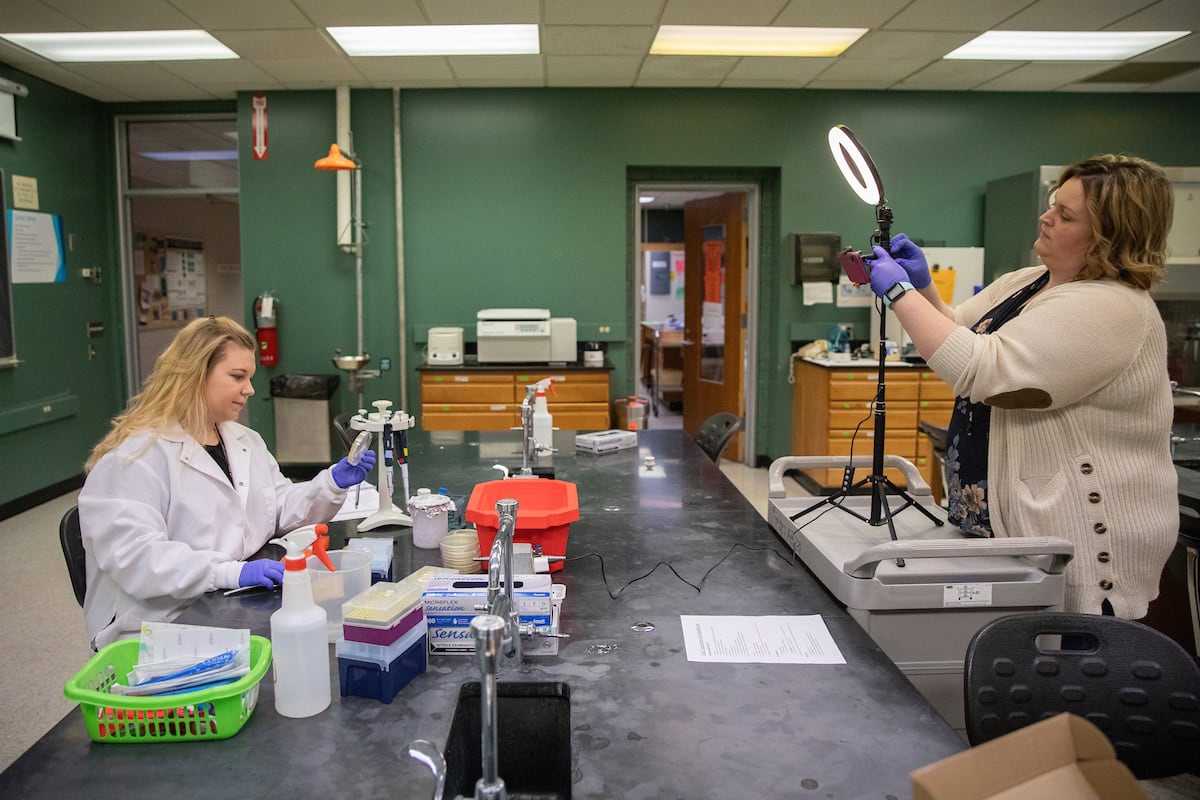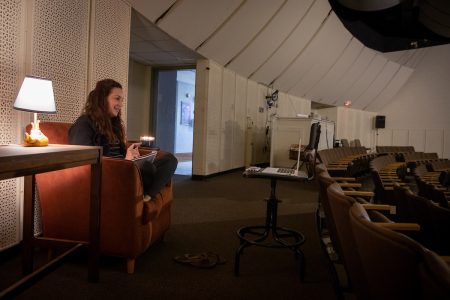Randolph Together: Professors take online learning to a new level with creative ways to engage students

Music professor Randall Speer recorded himself conducting with an accompanist last spring to send to chorale and orchestra students, so they could record themselves performing along to the same master track. The video was shot from multiple angles to give each group a unique view.
It’s mid-March inside Wimberly Recital Hall, and music professor Randall Speer is wildly waving his arms in front of a collection of iPhones strategically placed around the room on music stands, recording his every move.
When Randolph transitioned to online learning at the beginning of the pandemic, faculty members had to immediately adapt, finding unique ways to reach their students across space and time.
Speer and fellow music professor Emily Yap Chua figured out how to work with and assess their students from afar—hence the videos of Speer conducting. Those recordings were sent to students so they could record themselves performing along to the same master track.
Environmental studies professor Karin Warren held office hours via Zoom, adding different backgrounds to entertain her students (everything from Hogwarts to the deck of the Starship Enterprise). She also set up a server on the gaming platform Discord to make herself easily available for voice and message chat.
Biology professor Amanda Rumore condensed her normally 50-minute classes into 15- to 20-minute video lectures, taking students’ screen time into account. She and many other faculty members also made sure they were available for live meetings to check in with their students.

Amanda Rumore, biology professor, and Sara Harper, biology lab assistant, record a lab for students last spring.
“I love just talking to them about what’s going on in their lives and how their other classes are going,” she said. “That’s the one thing I missed, and what makes Randolph so special. We do still have those connections.”
Professors across every discipline not only had to learn new technologies, they had to adapt their curriculums to fit a virtual setting—all with very little notice. Almost immediately, institutional technology staff members began offering short workshops in Zoom and Google Meet and worked one-on-one with faculty to meet the needs of both professors and students.
Faculty with more experience in online learning also volunteered to help their colleagues.
“I see our faculty’s response as not an isolated reaction to our current circumstance, but an extreme example of qualities that have long been strengths of the Randolph College faculty, like accessibility, student-centeredness, and empathy,” said Provost Carl Girelli. “Our faculty have met the shift to remote learning as a challenge and an opportunity to gain and share skills, many of which will enrich the academic experience beyond this moment of crisis.”
When the College decided to continue online learning for the fall semester, faculty were ready.
“Professors have been more flexible and as easy going as ever,” Josh Bowes ’23 said. “They’re allowing more time on assignments and papers—a must with online learning and added complications like COVID-19. I’m appreciative of how readily available they’ve been. Most respond very fast and are always thorough in their answers and help.”
Bowes, a global studies major, said economics professor John Abell has been holding “interesting and extensive” lectures twice per week, focusing on different economic topics.
“Professors are noticeably going out of their way to make classes engaging,” he said.
English professor Laura-Gray Street said they’ve been able to do that because the decision to go online came early in the summer, giving them ample time to plan.
“It was a great gift,” she said. “We had all these tech trainings and sessions on pedagogy. I learned a lot, so I felt equipped coming into this fall semester with some confidence, with some tech tools that I didn’t have in the spring, and an idea of how to organize it better.”
Street said she and many of her colleagues have been able to find the silver linings.
“This has actually been a great boost for reinvigorating and refreshing my teaching,” she said. “There are things we will be able to take into face-to-face teaching and enhance it.”
A jumpstart
Before the semester even began, a group of first-year students got a head start in online learning, thanks to two special programs. Step Up to Physical Science and Engineering at Randolph (SUPER) and Summer Transition at Randolph (STAR) began online in mid-August, condensing their usual two weeks into one.
Participating students also received care packages that included books, school supplies, Randolph swag, party games, and even lab kits for those enrolled in SUPER.
“The whole point of the programs is creating a sense of community, so that was really scary coming into it,” said physics and engineering professor Peter Sheldon, who is also director of SUPER. “It made such a difference just to send them something. In the end, it was giving these students an opportunity to be equal partners in what we were doing.”
Kai Miller ’24, who was enrolled in STAR, said the experience helped prepare them for taking classes online this fall, offering experience on how to turn in assignments, use the course management system Moodle, and write emails to professors.
“My time in the program was absolutely amazing,” Miller said. “It’s helped me a lot this first semester and, if I’m being honest, if I hadn’t taken it, I could really see myself struggling.”
The programs offered an added benefit beyond Randolph’s orientation program for first-years and other new students. Miller said it taught students something else as well: “That while we were online, we could still have a good time together.”
Keeping the performing arts alive
Virtual learning presents a particular challenge to disciplines like music and theatre, but recent advances in technology have made a difference from the spring to fall semesters.
“On all these video conferencing programs, it’s unidirectional on the microphones. Sound only travels in one direction,” music professor Emily Yap Chua said when the College first transitioned to online classes. “We couldn’t do it where students could be singing at the same time as another musician. There’s also the delay for sound transmission, so that’s a problem that is really unique to instruction in our discipline.”
Apps developed over the summer addressed some of those problems, creating ways for participants to record themselves playing along to a guide track. The software then puts the individual videos together into one audio or video file.
“We can take it and play it back to them,” Chua said. “There’s a very low lag time between their performance and when they get feedback.”
Theatre professor Stephanie Earl took the opportunity to provide her students with real-world experience, adding tutorials on how to create audition tapes.

Theatre professor Stephanie Earl records a tutorial for students this fall.
“It used to be that all of your auditions, you did in person. You could make it there to audition, or you couldn’t,” Earl said. “Now I’d say about half of what actors do, even in theatre, is send in tape of themselves. That ended up being an incredibly useful thing in the spring, and I’ve kind of dug into that even more this fall. I’m trying to give my students lots of tutorials and have them put that into practice. For those who are going to pursue acting work, they’re going to be that much more ahead of the curve.”
Chua said the process has been helpful for her students as well, giving them more insight into the technical side of audio and video production.
“They’re learning things about microphone placement and microphone gain, and the kind of things you have to do in order to make a recording sound good. It’s just helping them think about all elements of the presentation of the performance,” she said. “Anything we can do that helps them see that we’re still creating and still performing in the capacity we have now, I think is important.”
A personalized experience—at home
From biology to theatre, faculty and staff worked to send a taste of Randolph to students this fall.

Biology lab technician Sara Harper and visiting biology professor Erin Heller put together lab kits for students taking Heller’s zoology course this fall.
Visiting biology professor Erin Heller and biology lab technician Sara Harper put together dissection lab kits for students taking Heller’s zoology course. Each package included 10-week’s worth of specimens and other supplies to work with at home. Students completed a different dissection each week, and Heller held a mix of synchronous and asynchronous class meetings, so they’d have the option of walking through the labs with her.
“The reason you come to a school like Randolph is to get that one-on-one, personalized experience,” Harper said. “Erin could have chosen to do virtual dissections, but that’s not the same level of experience. This way, we’re able to offer the same experience they would normally be getting on campus at home, which is essential for our majors.”
Faculty from all disciplines thought of creative ways to reach students. Heather Sinclair, the theatre technical director, sent supplies to students taking her scenic design and stagecraft classes. They would ship their final projects back to her for grading.
Classics professor Amy R. Cohen sent costuming elements to her cast for a virtual reading of the Greek Play, while English professor Laura-Gray Street collaborated with Pearl S. Buck Writer in Residence Fran Wilde to gather items for students taking her master class in October.
“Having something that promotes community really helps unify a class,” Wilde said. “Even just the act of opening the box is something a class does together. That’s a communal experience at that point. We’re figuring out how we connect across these sort of impossible distances.”
Their box included copies of Wilde’s books, a handwritten letter from her, and notecards and postcards featuring her sketches.
“The hallmark of an education at Randolph is the close, personal attention given to every student,” said Bradley Bateman, Randolph’s president. “Though our method of delivery may have been different, that commitment has not changed during this pandemic. COVID-19 presented challenges to everyone in higher education, but our faculty took it in stride and went above and beyond what was expected, creating innovative programs and curriculums that showed their dedication to our students and to teaching. Our community has come together to face this pandemic and displayed extraordinary strength and resilience. We should all be proud.”
Tags: biology, creative writing, English, fall 2020, music, online learning, Pearl S. Buck Writer in Residence, performing arts, remote learning, STAR program, SUPER, theatre, virtual learning, Vita No. 9, zoology
